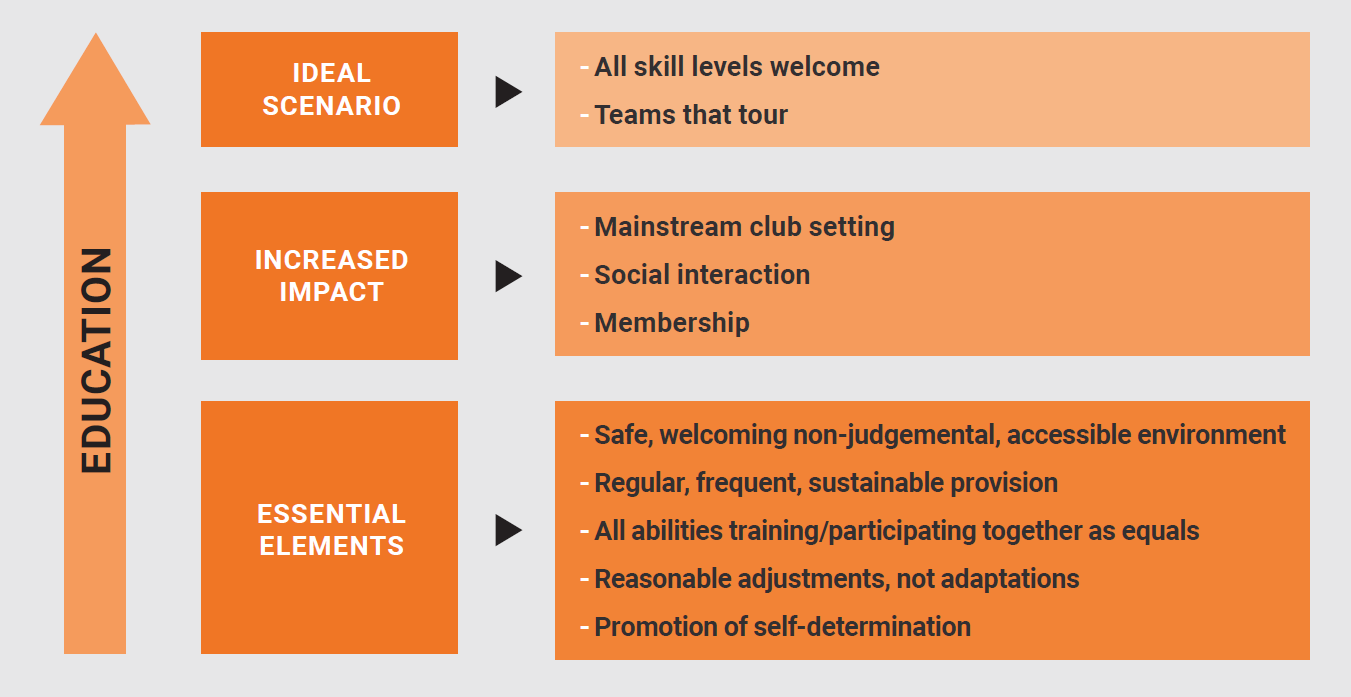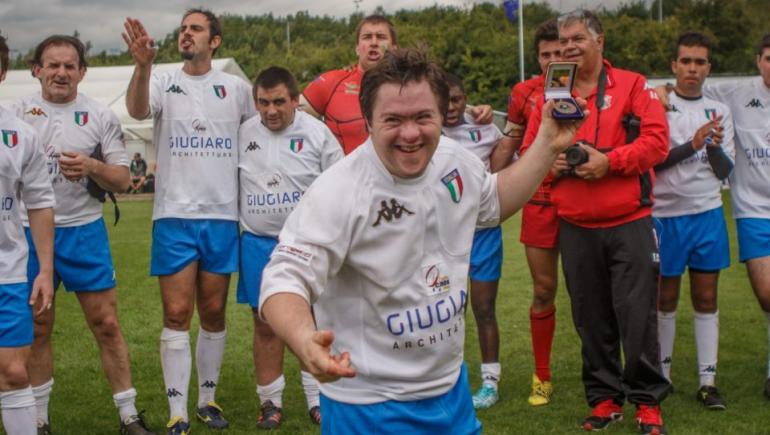 Each month ConnectSport works with the Sport for Development Coalition to create a 'call for articles'. This month we are asking ‘How do we make disabled people’s inclusion the norm in sport?' and below we hear from Mark Goodwin and Martino Corazza, from International Mixed Ability Sports (IMAS). To submit your article, contact [email protected].
Each month ConnectSport works with the Sport for Development Coalition to create a 'call for articles'. This month we are asking ‘How do we make disabled people’s inclusion the norm in sport?' and below we hear from Mark Goodwin and Martino Corazza, from International Mixed Ability Sports (IMAS). To submit your article, contact [email protected].
In order to make disabled people’s inclusion in sport the norm, we need to support mainstream, grassroots sports clubs to ensure they are truly open and welcome to everyone with an emphasis on participation and wellbeing. This involves a significant shift in culture as - although many clubs perceive themselves as inclusive - there are many, often unknown and unconsidered, barriers that prevent people from getting involved. These can result, for instance, from the lack of accessible infrastructure, costly membership models, or an excessive focus on performance and competition, but may also stem from people’s perceptions of sports clubs as being elitist, exclusive, and accepting only people form a certain background or who are already good at sport. Many potential participants worry they won’t fit in and won’t be welcome. For disabled people this is even more often the case if they don’t know for sure that the club will be able to understand their barriers and accommodate their needs.
International Mixed Ability Sports (IMAS) seeks to break down these barriers through championing the Mixed Ability (MA) model, which promotes social inclusion through sport, education and advocacy. MA sport involves disabled and non-disabled participants playing non-adapted sport together and socialising in the same mainstream club environment. MA education and advocacy sees participants of all abilities delivering training into community sports clubs and other mainstream organisations such as NGBs, around inclusion and diversity. These clubs and organisations are then supported by IMAS to establish MA activities, recruit participants from diverse sections of the community and to shift their focus from encouraging disability sport to removing barriers for everyone to play sport together. The IMAS Manifesto has been signed by organisations from the grassroots level through to national and international bodies such as Sport England, England Rugby and the Activity Alliance.

The positive impact that introducing MA to grassroots clubs has is substantial. At the individual level, both disabled and non-disabled participants report all the usual physical and mental health benefits that result from regular physical activity, but also report increased self-confidence, a raised awareness of, and reflection on dis/ability and diversity, a sense of belonging and feeling part of something innovative.
Mixed Ability bowls participant: "Some of our [boccia] team have become members here and I intend to join as well. It’s the fact that this takes us on the path to mixing with the regular members and not just playing against visually impaired opponents that I like."
At the club level, there is evidence of more inclusive and open cultures, where members are happier to discuss issues affecting them, improved club-level communication, new members who are more representative of the local community, more accessible infrastructure and coach development. These impacts then spread beyond the clubs to broader society with those involved with MA sport stating that their perceptions of dis/ability have shifted, they have raised awareness of potential barriers to participation that others may face and enhanced communication skills.
Mixed Ability tennis coach at Heaton Tennis and Squash Club: "Mixed Ability has massively changed the club! When we first mentioned the words ‘Mixed Ability’ and ‘disability’ it was like.... just because it’s a very traditional club, it was a members-only club so the fact that non-members would be coming in, it’s ‘well this is a tennis and squash club, you can’t start doing boxing and dance..’ But now [the members have] seen the effect it’s had on people and the fact that these participants go and socialise upstairs and they’ve met them and they’ve got involved themselves, it’s massively changed and they’re all ‘we want more Mixed Ability sports, we want more classes on'."
Mixed Ability tennis coach at Heaton Tennis and Squash Club: "The biggest impact on me has been the change in my attitude to all people I come across now... I do not worry about whether I’m saying or doing the right thing ... I see the person first."
In promoting MA, we frequently encounter challenges around the dominant social perceptions of disability. For example, in most cases, early perceptions are that non-disabled people involved with MA sport are ‘volunteers’ rather than equal participants, that MA sport will be less competitive and that disabled participants’ skills and abilities will be lower. After involvement with MA sport these perceptions change and people realise they can have a very meaningful and competitive sporting experience whoever they are participating with. Opportunities for social interaction also help break down perceptions around dis/ability and MA sport often results in diverse and rich friendships.
Member of the Bradford Amateur Rowing Club Mixed Ability rowing squad: "I did feel [a bit uncomfortable] but once I started becoming personally involved and being in a boat with [the Mixed Ability participants], all that went away… And I just thought 'It’s done me some good really, being part of this'. For me it has made it easier to be around people when I don’t understand what they’re saying."
Member of the Bradford Amateur Rowing Club Mixed Ability rowing squad: "I’ll be honest and say I was expecting [the Mixed Ability beginners] to be slower to get to this level. One thing I wasn’t sure about was how good their co-ordination and balance would be. And with both of them their balance is superb which makes a huge difference. As I’ve got to know them, I can see they spend every day being very active – probably much more so than an adult with a desk job."
In conclusion, we believe we need to radically change the way we think of, join in and enjoy sport, particularly at the grassroots level. The more clubs that embrace MA sport, the more the disabled people’s inclusion in sport will be the norm. Although mandatory targets for inclusion may lead to more disabled people playing sport, we think working with grassroots clubs and organisations across the sports and disability sectors would be a more effective way to increase inclusion and embed the long-lasting, sustainable change our society need.
If you would like to find out more about IMAS' work and the research that has been carried out by the University of Leeds and Loughborough University please contact us at [email protected] or find our resources here.










